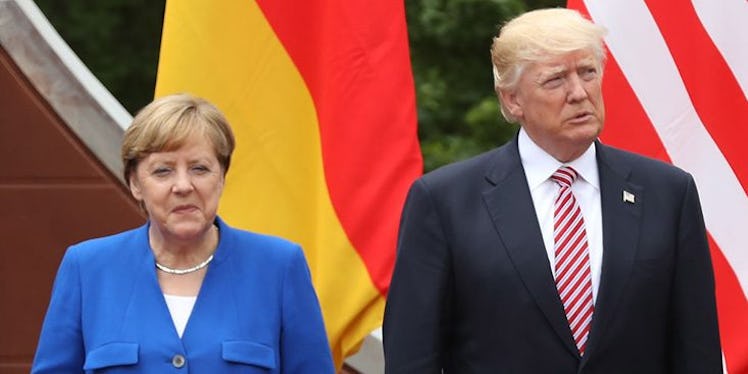
Trump Might Pull U.S. From Global Climate Change Deal: Here's What That Means
President Trump has yet to formally announce a decision on whether he will pull the U.S. from the Paris climate accord, however, multiple reports on Wednesday morning say he is expected to do just that.
The landmark agreement, made between nearly 200 countries who committed to combatting global warming, was led by former president Barack Obama and signed in December 2015.
As part of the agreement, the U.S. pledged to cut greenhouse gasses by at least 26 percent within 10 years. This would be done as part of a worldwide effort to keep global temperature increases below 3.6 percent.
Exiting the agreement would mean the U.S. would join just two nations who were not involved in the accord: Syria and Nicaragua.
Trump could still end up maintaining U.S. involvement in the pact. As the New York Times notes, he is set to meet on Wednesday with Secretary of State Rex Tillerson, who is in favor of keeping the agreement. Plus, the president has been averse to making U-turns at the last minute on major policy decisions, like he did on NAFTA.
However, if the president does end up withdrawing the country from the Paris accord, as all signs indicate, it'd mean a few significant things.
Obama's legacy undone
Exiting the Paris accord would mean Trump has practically undone former president Obama's efforts to combat climate change. Trump had already signed a series of executive orders to reverse Obama's initiatives that aimed to achieve environmental protection.
However, cutting U.S. involvement in the Paris accord would undoubtedly be the biggest step.
The fact Obama's most notable achievement in fighting against Climate Change could so easily be unraveled is no surprise. As Politico noted, around the time the agreement was signed, the fate of the agreement was always vulnerable and liable to be changed by the next administration.
Now that next administration is here, it looks like it's in favor withdrawing.
Campaign Promise
During his presidential campaign, Trump had long stated his intention to withdraw from the Paris agreement.
His reasoning? The accord was not a good deal for the nation, calling it a "one-sided" decision which demanded the U.S. pay large amounts of money while other leading nations would not pull their fair share.
In the meantime, Trump claimed, U.S. involvement would come at the cost of jobs.
Since the President entered the White House, his opposition to the deal had softened a bit.
However, committing to withdrawal now would mean he ultimately fulfilled a promise he delivered over and over on the campaign trail.
Leadership abandoned
Without U.S. involvement, the Paris accord is unlikely to suffer a breakdown. However, there are some critics of a possible withdrawal who warn that pulling back from the agreement would be a hit to the idea that the U.S. can be depended upon.
R. Nicholas Burns, former under secretary of state for George W. Bush's administration, told the New York Times,
From a foreign policy perspective, it's a colossal mistake — an abdication of American leadership. The success of our foreign policy — in trade, military, any other kind of negotiation — depends on our credibility. I can't think of anything more destructive to our credibility than this.
Democrats are already adopting that line -- about abdicating leadership duties -- as their main criticism against a withdrawal from the Paris agreement.
Without a U.S. presence within the deal, other countries, like China, are expected to take the lead.
Climate denial
The debate within the White House over whether Trump should actually withdraw has been reported as a battle between two factions.
On one side, there are figures like Ivanka Trump, Jared Jushner, and Rex Tillerson, who advise keeping the status quo. Then, there are people like Attorney General Jeff Sessions and Steve Bannon, guys who not only advocate for leaving the agreement but doubt the idea of man-made global warming altogether.
Should Trump ultimately decide to leave the agreement, it would be a victory for climate change deniers within his administration.
That's part of the reason why Republican senator Lindsey Graham has called for Trump to maintain the agreement. Whether the president actually listens remains to be seen.